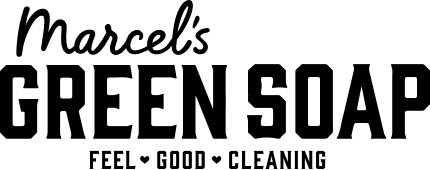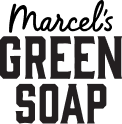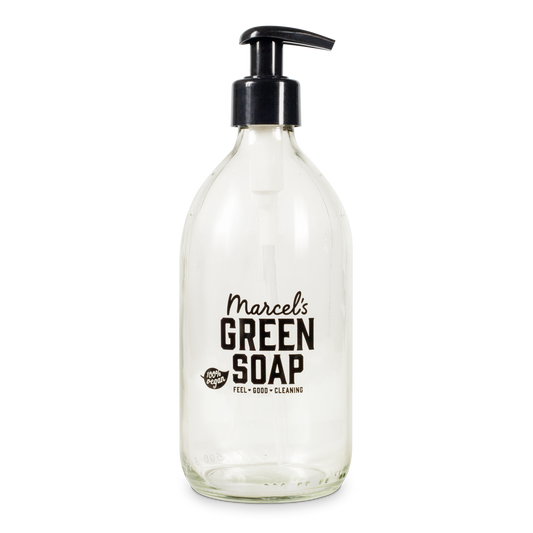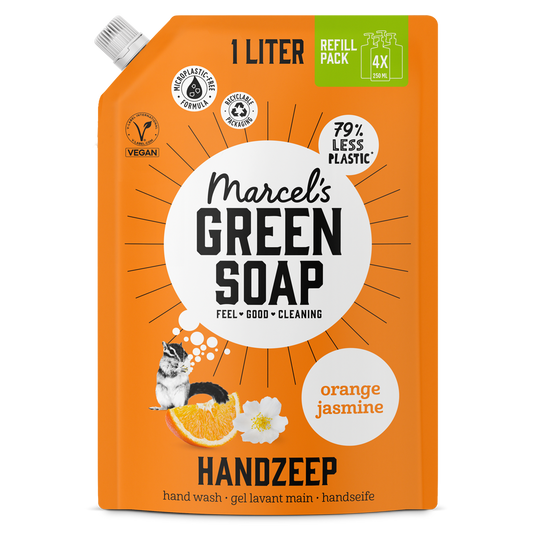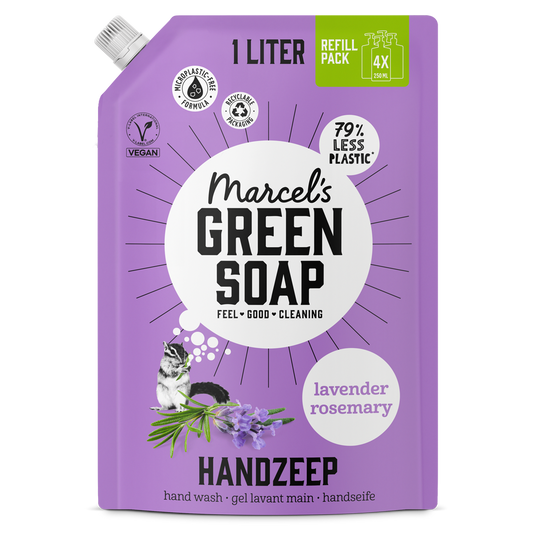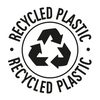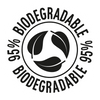Marcel was interviewed for MVO Nederland in January 2024. Curious about the article? You can read it here:
'Marcel Belt on how the light green consumer leads the way to commercial and sustainable success'
You have probably seen the Marcel's Green Soap commercials on TV. Short, colorful and cheerful, Marcel himself talks about how good his products smell. And how good they are for the earth. The brand has quickly acquired a position in the competitive cleaning products market. With a commercial slant and an attractive sustainable story. How this came about and what the light green consumer has to do with it, you can read in this interview we had with founder Marcel Belt at his office in Haarlem.
Marcel's Green Soap. I think many people know your brand, but many have no idea where you suddenly come from. How did your company come about?
“I worked at Unilever for years, mainly in care and cleaning products. That all went well, but I wanted more sustainable. That was possible there, but not as quickly as I wanted. I don't blame Unilever for that, by the way. But I wanted to build a brand myself, as if it were a plant that I pampered. That was the most important thing for me, although it was also because I built many brands at Unilever. In addition, I had an extensive network at supermarkets, media agencies and raw material suppliers. I knew the market and could therefore get started quickly.”
However, it is not so obvious to start a new company if you are over fifty.
“In general, I see people becoming risk-averse at this age. But I am an entrepreneur, just like my father. I can't do anything else. I also wanted to spend more time with my three daughters. Suddenly I could decide for myself when I went out.”
You indicated that you already had a lot of experience, which of course helps. But how did you get started?
“Together with a former colleague from Unilever, we started asking questions about existing cleaning products: why? Why are these raw materials in it? Why is the packaging made of plastic? Why do ingredients come from abroad? Step by step we discovered where opportunities lay. Essential for us: testing. With panels in six focus groups, we matched the brand, product and scents to the customer. Until we dared to produce an initial production of 80,000 bottles of Marcel's Green Soap. Fortunately, I was quickly able to get rid of them at Marqt – now Ekoplaza – and Intratuin. We continued to build from that foundation.”
What does the cleaning products market traditionally look like?
“That market is broad and actually includes all products with a soap-like ingredient. Gels, shampoos, deodorants, toilet cleaners. Hundreds of billions of euros are involved. And the market is dominated by a few large companies. Sustainability is still slow. These big companies are too attached to the status quo. Change costs money and entails risk. Plus they want to express everything in economic and financial terms. I think that's a shame, especially for our planet. It is not without reason that Marcel's Green Soap was first available at two chains that kept themselves somewhat out of this violence. That was easier.”
And after Marqt and Intratuin, what happened next?
“It was a great testing period, especially considering how small we were at the time. Six months after introduction, the first variants ran out and we placed an additional order. That gave us confidence to make more and, for example, to work on our design. To this day, I am one hundred percent owner, so I decide everything myself. And I choose to put all my money into the brand. So no expensive building on the Herengracht, but a modest office in Haarlem. So a lot of testing, taking steps back and making adjustments. And therefore focus heavily on online advertising. That suits me and it works.”
"You don't become more sustainable by keeping everything close to yourself. Everyone can see and know everything about us. And if competitors take over something, that's no problem." Marcel Belt, Green Soap
Your sustainability strategy is quite distinctive, is that correct?
"Of course. The core is testing, testing, testing. At Unilever, for example, we spent 200,000 euros on marketing campaigns and then you just had to see where it landed. Now I make three short videos, put them online and continue with the one that gets the most clicks. Flexible working defines our brand. We also do this with sustainability, we don't have to do everything perfectly right away. For example, our first packaging came from a mold that is normally for pokon and motor oil bottles. We put the costs we saved back into marketing.”
You are now also available at Albert Heijn. How did that happen?
“Sixty percent of consumers in a supermarket are, as we call it, light green. In other words: they want to be more sustainable, but it should not cost too much effort or money. This is in contrast to the dark green consumer, who puts everything aside for a sustainable choice. However, the shelf with cleaning products is ninety percent aimed at gray consumers. While sixty percent is light green. That is exactly my argument for entering supermarkets. In addition, the supermarket can ask for more margin for sustainable products. Ultimately, Albert Heijn saw this and started working with us.”
I have the feeling that it all happened very quickly for you. Does that have to do with the fact that you already had that experience and that network?
“I think we listen to the consumer better than others. I always come up with solutions for problems that consumers recognize before I start making a 100% sustainable product. It is not without reason that we first opted for packaging made of recycled plastic. Our customers wanted that. And while many people in the industry told me that it was not sturdy and safe enough. Let alone that it would be beautiful. We've proven the opposite, I think. The customer buys it and we get zero complaints.”
Ah, so after that plastic thing you moved on?
“Yep. After recycled plastic, people started calling: is Marcel's Green Soap vegan? So no. We also used animal ingredients, just like others. They have now been completely replaced by vegetable glycerin and oils. The next step? Palm oil. And that was difficult, because it foams and degreases so well. Just what people want. But growing that oil is disastrous for the rainforests, the lungs of the world. So now we use linseed and rapeseed oil from Europe. They have a similar effect, although they are slightly more expensive and they foam slightly less. That's why we decided to use these oils mainly for laundry and dishwashing, where foam is less important. We have also been completely microplastic-free for a year and a half. The great thing about this is that there is also a law in this area. It becomes the norm. That makes us attractive to suppliers. They can already distinguish themselves through us.”
Where does the resistance to sustainability among the major brands come from?
“A company's factory counter says that recycled is not strong enough. The financial counter says it is too expensive. And then you have three other counters that are also not keen. There is often a manager above all those counters who is mainly held accountable for what goes wrong. I am an entrepreneur. I just have to make sure things go well. That is the difference."
What drives you every day? What makes you happy?
"I get energy from the combination of success and being meaningful. There are continuous opportunities to improve. I also like that we are open and transparent about everything we do. You cannot become more sustainable by keeping everything close to yourself." Everyone can see and know everything about us. And if competitors take something over, that's no problem, haha!”
How big is Marcel's Green Soap now?
“We now have a turnover of around 15 million euros per year and employ 15 people. We work in a relatively small office and outsource almost everything. This way we have little on the balance sheet and we remain flexible.”
We highlight your biodiversity. What does that theme mean for you and the company?
“The most striking thing we do for nature is that we use virtually no palm oil. We are almost unique in that. The rainforests are an incredible source of biodiversity. If you consider that forty-five billion liters of palm oil are grown per year and that there are about nine billion people, then each person uses five liters of palm oil per year. That's bizarre. And not necessary at all. Certainly not if you know that there are plenty of alternatives. We also invest in animal protection funds such as World Animal Protection. Ultimately, biodiversity is the most important sustainability topic, but too few companies actually act on it. Us too, by the way. How does that happen? Consumers are not yet speaking to companies enough about this subject, but that will definitely happen. I'm convinced of that."
How do you view progress on the theme of biodiversity? Are we going to make it?
“Yes, we are going to save our nature. It will have to be done. The only pity is that we are late. But our world will soon look very different. We will look back and think: how do you think about putting millions of chickens in cages? I'm just afraid that we will get into each other's throats again about who was wrong. That won't change.”
What does your future look like?
“We are of course still a small player, but we are a catalyst to get the rest in motion. For now, we mainly want to increase our market share, around two percent. We also want to internationalize. We are now available via Amazon in Germany, England and France, among others. But we do see that the competitive field is different there, just like the prices. That poses challenges. But it also makes me realize how good the business climate is in the Netherlands. It may also be said.”
How does the partnership with MVO Nederland help you?
“I only recently became a partner, because I would like to spar with like-minded companies. And, if possible, set up collaborations and develop commercial propositions. I think the strength also lies in bringing together large and small companies, I'm looking forward to it!”
Finally, what is needed from politics to make things easier for you?
“The power of the large, polluting companies is still too great. I would like to call on politicians to support companies that want to be more sustainable and want to grow. And not to put everything on the economic yardstick. This will not benefit us as a society or nature.”
What is the most important tip you would like to give to other companies?
“Stay close to yourself, then you will be and remain credible. And try to stay that way if you have to raise money. Keep control for as long as possible and as long as it feels good.”
